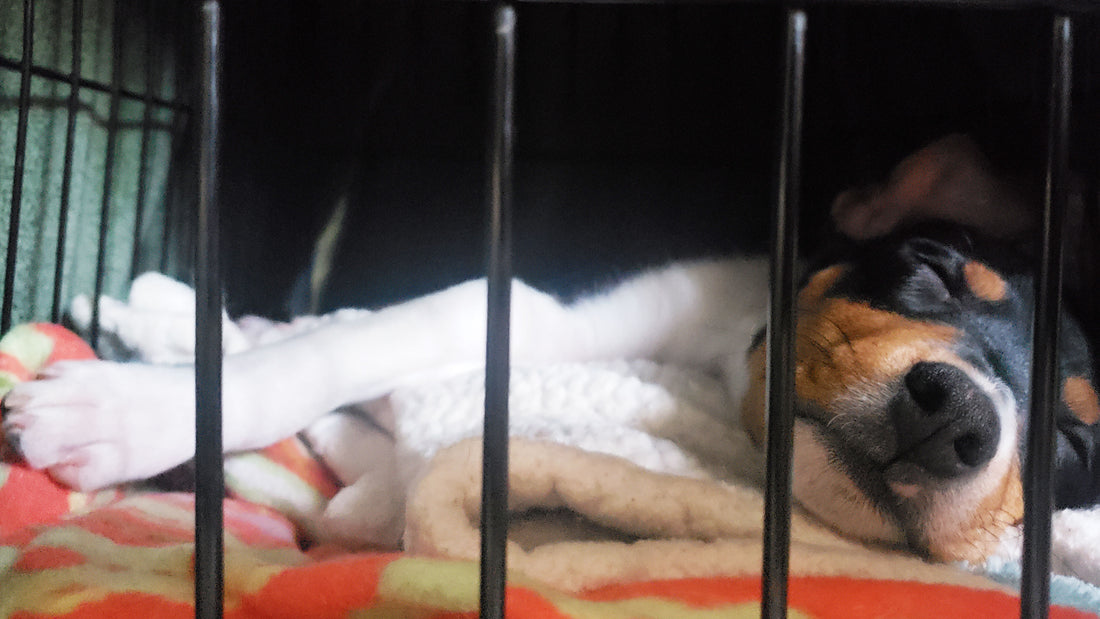Our Puppy Day School program is built for young bodies to learn, grow and fulfill their potential. One aspect we're both asked about a lot and can present a challenge in this setting is crating and downtime. I'll address both separately.
When they are with us from 7:30am - 1:00pm give a little on either side for pick up and drop off, why would we rest them? Well, overly tired puppies are not productive puppies, they can and do make less desirable choices and learning retention isn't nearly as strong. Overly tired puppies can be easily overwhelmed. The opposite of what our goals are here. They have multiple structured activities daily, each focused on different aspects of development. As a baby, could you run a marathon? Probably not. They can't either, but they will try! We as their caregivers during their time with us are focused on optimizing their time with us, and with that, we need to be sure we don't overwork them. During transitions and potty breaks, we address this by providing them with short bouts of rest time in their crates. If you've ever been with an overly tired puppy, even for a few minutes, you know exactly why this rest is vital. We always describe it as the kid who was at the zoo an hour too long and is now losing their mind over nothing identifiable. Not good. Crating comfortably amongst other dogs and in places outside the home is also an incredibly valuable skill set if they're ever to dabble in the dog sports world, or even travel with you.
So what happens when a puppy has never been exposed to a crate or only sleeps overnight in one? A couple things are likely to occur:
- Fear of Missing Out (FOMO)
- Anxiety of Being Alone or Confined
FOMO typically presents as a dog who overnights well in their crate because nothing is going on so there is nothing to miss out on, but when the household is active, the puppy screams if confined. If we are cycling dogs in Puppy Day School, this frustration of not being out while others are impacts their ability to rest. This causes serious frustration for the dog. Frustration = stress, and this type of stress is not good for a puppy.
Fear of Being Alone. This has historically been infrequent, but as we're in the midst of a pandemic, everyone is home, and so nowadays we're seeing multiple puppies weekly who are facing this. This can quickly turn into full blown anxiety, and that is a very real, very serious problem that has long term detrimental effects on quality of life. Dogs experiencing this are suffering. It's not something to take lightly or assume they'll grow out of. They don't.

So how do these things impact their Puppy Day School programs? Stress is cumulative. If they are unable to rest, worked into a state of stress frequently, it impacts everything. Their learning, their ability to make good choices in play, their moods, their interest in training and their perception of the world. If this doesn't sound right, think of you own behavior. Have you ever dealt with low or high grade stress throughout the day, then something seemingly minor (like having to decide what's for dinner) send you over the top? That's cumulative stress.
How extensively does it impact the program? It impacts it a lot. Have you ever tried to sleep next to someone who snores loudly? It sucks. Ask my partner. But that's nothing. Imagine trying to sleep next to someone screaming nonstop, or every few seconds. When puppies come into the program without this skill, it impacts all their puppy classmates. They can't get rest either. If one of those puppies struggles with sound sensitivity, it can be downright scary for them.
It impacts us trainers too. When you know without question that a dog is struggling, you go through the day holding that stress with you too, and there are decisions that take place, sometimes decisions the families don't want to hear but that are right for the dog. Ethical. our mantra is do no harm.
We need to keep very close tabs on dogs that struggle with this. These dogs desperately need socialization. Their worlds are smaller than ever right now with the pandemic. They also need down time for us to optimize their progression through the programs. It's also against our ethics to place them in harm's way. This presents us with a conundrum. Is it better to sacrifice some stress for socialization? How stressed is this puppy in their down time? Is it impacting others? Is it impacting their progress? The problem with all of this is that it requires a sacrifice either in the dog feeling crate stress or by removing them from the program and missing out on socialization. These decisions can become very complex factoring a number of attributes. All of this takes time away from what our program is built for - Socialization and in the case of Ultimate Puppy Clients - Training.
So why don't we work on crating as part of the program? We actually do, but our role is primarily maintenance of skills that were started in the home. This week is what has spurred me to write about this because this week has been very taxing for the struggling dogs and for my team. This week, we have several dogs who do not have crating skills who started the program. It's been extremely loud. Restful it is not. I worry about my neighboring businesses getting upset too.
So what do we do when this happens? During playgroup when we have the ability, and we have dogs struggling, we will work in shifts where 3 will run playgroup with (for instance) the smalls, and another trainer will work on happy crating with the bigs, walking up and down the aisle and feeding the puppies who are crated treat by treat, working to build a positive association. Sometimes though, playgroup requires all trainers to be present, and so to remove one to work on crating isn't always possible. This then leads to dogs who are not resting during their breaks. And the cycle continues, where we aren't able to optimize their programs because we don't have all pieces in play.
Why not hire another trainer to work specifically on crate training? Well, sticker shock. Our program is paid in a lump sum. The cost being $1900 for Ultimate Puppies for 4 weeks of half-days. In reality, that is actually approximately $23 per hour which is a screaming deal for professional training that you just need to maintain at home, (don't forget there are 2 private sessions included in the Ultimate package if you think my math is off) and the program comes with weekly instructional videos and material so you can keep up to speed on what we're doing, and start building a training relationship with your puppy on the skills they've learned here at home. A freaking steal! But if we raise rates higher to bring in more help, it causes more sticker shock. If we hired another trainer without raising rates we would go into the negative in a serious hurry. We need to keep things economical or this wonderful program becomes out of reach financially for puppies who really need it.
If we just take on more dogs, we don't get to spend as much time with each, and they would then spend a ton of time in those darn crates, so it's a fine line. Places that don't cap numbers cap the amount of time spent with each dog. If you want to pay all that for mostly daytime boarding and a little training and socialization, that's fine, but that's not our program. We have very high standards for our programs and for our trainers, and part of that is optimizing their programs, not getting greedy, and serving each individual dog's needs.
And that's where our clients come in. This crating thing. We really need your help prior to dogs attending the program in getting them acclimated to their crates. These short bouts of rest are important for the dog's overall well-being, allow us to focus on the job you hired us to do (training and socialization) and we can perform to the best of our abilities under these contexts. We can help your dog meet their full potential. Doesn't that sound way better than meeting some of their potential?
So parents, you've gotta set aside time for this. No, crate training isn't super fun or glamorous, but it is important for your puppy and it will help us make the most of your investment. Because dogs that cannot comfortably crate take away the quality of the program for themselves and other puppy clients, we have to make hard choices about their ability to stay in or be released from the program, so please do your part. Get them going on daytime crating skills, get them comfortable in there for short bouts, and we will all win! You will have a crate training plan and instructions sent to you prior to attending to guide you on this.
And you know what? That skill will definitely come in handy in the future for travel, camping, dog sports, surgeries, etc. Your puppy is worth it!

